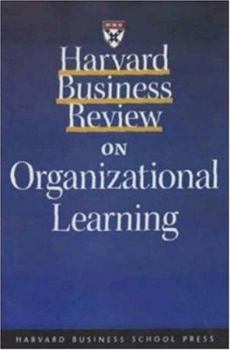Harvard Business Review on Organizational Learning
Select Format
Select Condition 
Book Overview
Harvard Business review is the place to learn about important management issues, bringing today's managers and professionals the information they need to stay competitive in a fast-moving world. From the preeminent thinkers whose work has defined an entire field to the rising stars who will redefine the ways we think about business, here are the leading minds and landmark ideas that have established Harvard Business Review as required reading for ambitious business people in organizations around the globe.
Format:Paperback
Language:English
ISBN:1578516153
ISBN13:9781578516155
Release Date:June 2001
Publisher:Harvard Business Review Press
Length:224 Pages
Weight:0.66 lbs.
Dimensions:0.6" x 5.8" x 8.0"
Customer Reviews
2 ratings
Great Practitioner Guide!
Published by Thriftbooks.com User , 19 years ago
This is another great book in the extraordinary Harvard Business Review (HBR) paperback series. It is one of the books I highly recommend. This book begins with an outstanding article on communities of practice by Wenger & Snyder. If you can't read Wenger & Snyder's entire book, be sure to read this article/chapter. There is a chapter by Pfeffer & Sutton on the knowing-doing gap that's very helpful. John Seely Brown and Paul Duguid offer a fascinating chapter on knowledge transfer through casual discussion. Perhaps the most useful chapter in the book is Hansen, Nohria, & Tierney's article on managing knowledge. In this chapter, they discuss the critical distinction between codification and personalization knowledge management systems. This chapter alone is worth the cost of the book. Add to these chapters the work of Argyris, Mintzberg, and others, and you have a resource every practitioner should own. Michael Beitler Author of "Strategic Organizational Learning"
"If you think education is expensive, try ignorance."
Published by Thriftbooks.com User , 23 years ago
The title of this review is borrowed from Derek Bok who, when president of Harvard, responded to parents who crticized a recent tuition increase. Now the review.This is one in a series of several dozen volumes which comprise the "Harvard Business Review Paperback Series." Each offers direct, convenient, and inexpensive access to the best thinking on the given subject in articles originally published by the Harvard Business School Review. I strongly recommend all of the volumes in the series. The individual titles are listed at this Web site: www.hbsp.harvard.edu. The authors of various articles are among the world's most highly regarding experts on the given subject. Each volume has been carefully edited. Supplementary commentaries are also provided in most of the volumes, as is an "About the Contributors" section which usually includes suggestions of other sources which some readers may wish to explore.In this volume, we are provided with eight separate but related articles in which their authors examine these subjects: "The Organizational Frontier" (Wenger and Snyder), "The Smart-Talk Trap" (Pfeffer and Sutton), "Balancing Act: How to Capture Information Without Killing It" (Brown and Duguid), "What Your Strategy for Managing Knowledge?" (Hansen, Nohria, and Tierney), "Good Communicating That Blocks Learning" (Argyris), "Coevolving: At Last a Way to Make Synergies Work" (Eisenhardt and Galunic). "Organigraphs: Drawing How Companies Really Work" (Mintzberg and Van der Heyden), and "Stop Fighting Fires" (Bohn). Here are a few brief excerpts:"As communities of practice generate knowledge, they renew themselves. They give both the golden eggs and the goose that lays them." (Wenger and Snyder)"People will try to sound smart not only by being critical but also by using trendy, pretentious language." (Pfeffer and Sutton)"[Organizational defensive routines] consist of all the policies, practices, and actions that prevent human beings from having to experience embarrassment or threat and, at the same time, prevent them from examining the nature and causes of that embarrassment or threat." (Argyris)"The most effective decision makers are those at the business-unit level, where strategic perspective meets operating savvy." (Eisenhardt and Galunic)No brief commentary such as this can do full justice to the rigor and substance of the articles provided. It remains for each reader to examine the list to identify those subjects which are of greatest interest to her or him. My own opinion is that all of the articles are first-rate. For me, one of this volume's greatest benefits is derived from various charts and diagrams included such as "How Consulting Firms Manage Their Knowledge" (on page 68). Here Hansen, Nohria, and Tierney juxtapose Codification with Personalization in areas such as competitive strategy, economic model, knowledge management strategy, information technology, and human resources. Another valuable chart is found on page 168. Bohn lists a ser





